
Tech Policy Press
@techpolicypress.bsky.social
Technology + democracy.
Visit https://techpolicy.press
Join our newsletter: https://techpolicy.press/newsletter
Opinions do not reflect the views of Tech Policy Press. Reposts do not equal endorsements.
Visit https://techpolicy.press
Join our newsletter: https://techpolicy.press/newsletter
Opinions do not reflect the views of Tech Policy Press. Reposts do not equal endorsements.
The EU’s Digital Omnibus could roll back key parts of the GDPR, AI Act, and ePrivacy rules — laws that set global standards for privacy and AI. Leaked drafts suggest companies could get more leeway on data use and slower enforcement, reports Ramsha Jahangir.
buff.ly/IIjZo2a
buff.ly/IIjZo2a

November 10, 2025 at 4:24 PM
The EU’s Digital Omnibus could roll back key parts of the GDPR, AI Act, and ePrivacy rules — laws that set global standards for privacy and AI. Leaked drafts suggest companies could get more leeway on data use and slower enforcement, reports Ramsha Jahangir.
buff.ly/IIjZo2a
buff.ly/IIjZo2a
There’s more online election talk than ever—but researchers see less. As part of a new series, Josephine Lukito & Kaitlyn Dowling show how shrinking platform data hinders understanding of the digital political sphere.
www.techpolicy.press/there-is-mor...
www.techpolicy.press/there-is-mor...

November 10, 2025 at 1:39 PM
There’s more online election talk than ever—but researchers see less. As part of a new series, Josephine Lukito & Kaitlyn Dowling show how shrinking platform data hinders understanding of the digital political sphere.
www.techpolicy.press/there-is-mor...
www.techpolicy.press/there-is-mor...
Could errors from an AI surveillance tool cause ICE to grab and detain you? The agency’s use of facial recognition — and alarming new details on its reckless procedures for doing so — make that sci-fi-sounding nightmare an all too real risk, argues Jake Laperruque.
buff.ly/s0o5o7V
buff.ly/s0o5o7V

November 9, 2025 at 2:30 PM
Could errors from an AI surveillance tool cause ICE to grab and detain you? The agency’s use of facial recognition — and alarming new details on its reckless procedures for doing so — make that sci-fi-sounding nightmare an all too real risk, argues Jake Laperruque.
buff.ly/s0o5o7V
buff.ly/s0o5o7V
By resisting surveillance and extraction and pursuing goals such as affordability, dignity, and justice, New York City Mayor-elect Zohran Mamdani can show how technology can truly serve people, writes Rebecca Williams. The first step, she says, is to protect immigrants.
buff.ly/Mwk8vRu
buff.ly/Mwk8vRu

November 8, 2025 at 3:01 PM
By resisting surveillance and extraction and pursuing goals such as affordability, dignity, and justice, New York City Mayor-elect Zohran Mamdani can show how technology can truly serve people, writes Rebecca Williams. The first step, she says, is to protect immigrants.
buff.ly/Mwk8vRu
buff.ly/Mwk8vRu
How can we understand platforms that shape our world? As part of a new series, KGI’s Leticia Bode and Peter Chapman explore why access to platform data matters and introduce the “Better Access” framework for improving access for researchers.
buff.ly/VFZpsuE
buff.ly/VFZpsuE

November 7, 2025 at 1:56 PM
How can we understand platforms that shape our world? As part of a new series, KGI’s Leticia Bode and Peter Chapman explore why access to platform data matters and introduce the “Better Access” framework for improving access for researchers.
buff.ly/VFZpsuE
buff.ly/VFZpsuE
Online platforms shape what we know, how we connect & who gets heard. In partnership with KGI, we are launching a new series, Seeing the Digital Sphere: The Case for Public Platform Data. The series starts today, with an essay from Leticia Bode & Peter Chapman.
www.techpolicy.press/seeing-the-d...
www.techpolicy.press/seeing-the-d...

November 6, 2025 at 2:30 PM
Online platforms shape what we know, how we connect & who gets heard. In partnership with KGI, we are launching a new series, Seeing the Digital Sphere: The Case for Public Platform Data. The series starts today, with an essay from Leticia Bode & Peter Chapman.
www.techpolicy.press/seeing-the-d...
www.techpolicy.press/seeing-the-d...
By resisting surveillance and extraction and pursuing goals such as affordability, dignity, and justice, New York City Mayor-elect Zohran Mamdani can show how technology can truly serve people, writes Rebecca Williams. The first step, she says, is to protect immigrants.
buff.ly/Mwk8vRu
buff.ly/Mwk8vRu

November 6, 2025 at 2:01 PM
By resisting surveillance and extraction and pursuing goals such as affordability, dignity, and justice, New York City Mayor-elect Zohran Mamdani can show how technology can truly serve people, writes Rebecca Williams. The first step, she says, is to protect immigrants.
buff.ly/Mwk8vRu
buff.ly/Mwk8vRu
Could errors from an AI surveillance tool cause ICE to grab and detain you? The agency’s use of facial recognition — and alarming new details on its reckless procedures for doing so — make that sci-fi-sounding nightmare an all too real risk, argues Jake Laperruque.
buff.ly/s0o5o7V
buff.ly/s0o5o7V

November 6, 2025 at 1:19 PM
Could errors from an AI surveillance tool cause ICE to grab and detain you? The agency’s use of facial recognition — and alarming new details on its reckless procedures for doing so — make that sci-fi-sounding nightmare an all too real risk, argues Jake Laperruque.
buff.ly/s0o5o7V
buff.ly/s0o5o7V
Elon Musk’s Grokipedia is one of many experiments designed to replace human-generated writing with LLMs. But Ryan McGrady argues that its defining feature is its use of technological power to re-exert top-down authority over information and knowledge.
buff.ly/odvgs4q
buff.ly/odvgs4q

November 5, 2025 at 3:31 PM
Elon Musk’s Grokipedia is one of many experiments designed to replace human-generated writing with LLMs. But Ryan McGrady argues that its defining feature is its use of technological power to re-exert top-down authority over information and knowledge.
buff.ly/odvgs4q
buff.ly/odvgs4q
Erich Mische argues that the US national strategy to prevent suicide failed to address the risks posed by social media and AI. That's why he's come to regret signing it — and calling for a new plan. Read more:
buff.ly/V1uub65
buff.ly/V1uub65

November 4, 2025 at 7:31 PM
Erich Mische argues that the US national strategy to prevent suicide failed to address the risks posed by social media and AI. That's why he's come to regret signing it — and calling for a new plan. Read more:
buff.ly/V1uub65
buff.ly/V1uub65
Brussels presses China in talks as rare earth and chip controls expose EU’s vulnerability in the global AI race, reports Raluca Besliu. The restrictions come as the EU rolls out its €1 billion Apply AI Strategy across healthcare, robotics, and defense.
buff.ly/Vl2NkXK
buff.ly/Vl2NkXK
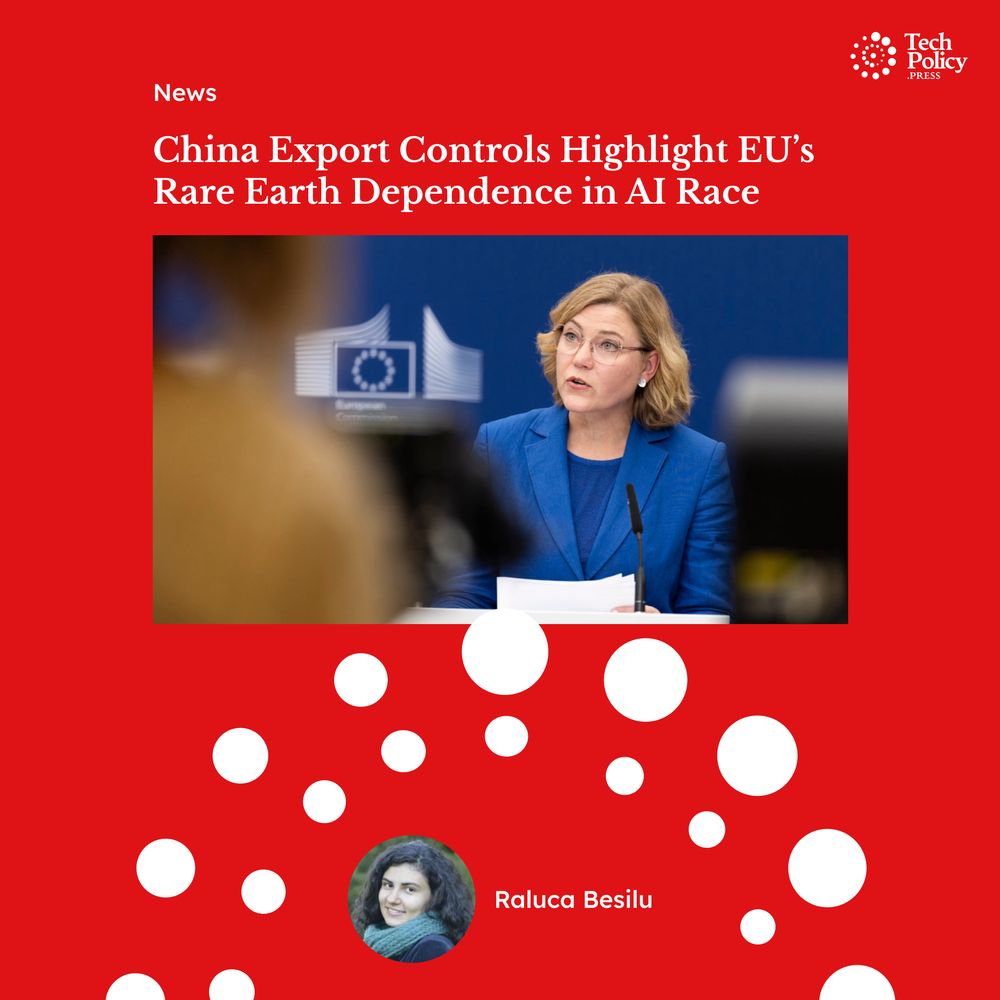
November 4, 2025 at 3:30 PM
Brussels presses China in talks as rare earth and chip controls expose EU’s vulnerability in the global AI race, reports Raluca Besliu. The restrictions come as the EU rolls out its €1 billion Apply AI Strategy across healthcare, robotics, and defense.
buff.ly/Vl2NkXK
buff.ly/Vl2NkXK
Meta and Google’s decision to ban political ads in the EU isn’t just a regulatory adjustment, it’s a setback for accountability and election integrity, writes Fabio Votta. Drawing on 5 years of tracking political ads, he explores the ban's impact on transparency.
buff.ly/BRbLgUw
buff.ly/BRbLgUw
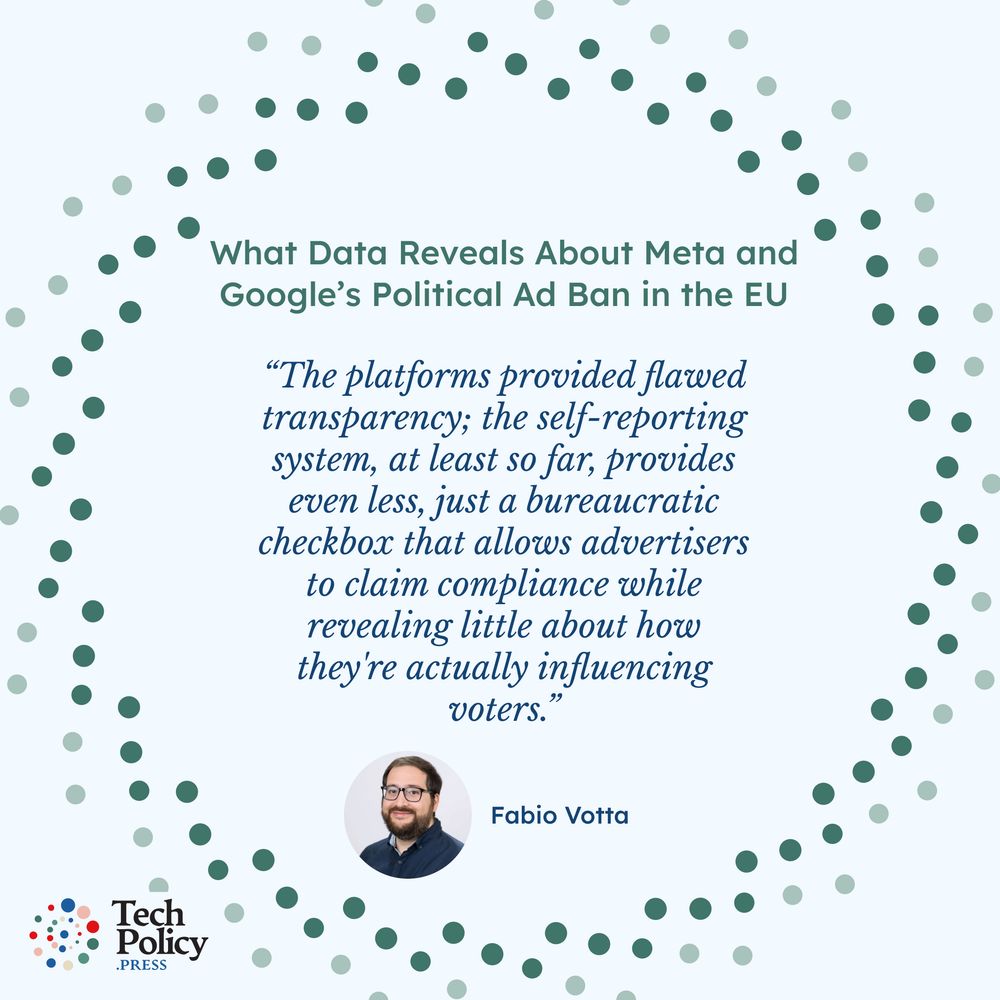
November 4, 2025 at 3:03 PM
Meta and Google’s decision to ban political ads in the EU isn’t just a regulatory adjustment, it’s a setback for accountability and election integrity, writes Fabio Votta. Drawing on 5 years of tracking political ads, he explores the ban's impact on transparency.
buff.ly/BRbLgUw
buff.ly/BRbLgUw
Elon Musk’s Grokipedia is one of many experiments designed to replace human-generated writing with LLMs. But Ryan McGrady argues that its defining feature is its use of technological power to re-exert top-down authority over information and knowledge.
buff.ly/odvgs4q
buff.ly/odvgs4q

November 4, 2025 at 1:30 PM
Elon Musk’s Grokipedia is one of many experiments designed to replace human-generated writing with LLMs. But Ryan McGrady argues that its defining feature is its use of technological power to re-exert top-down authority over information and knowledge.
buff.ly/odvgs4q
buff.ly/odvgs4q
Meta and Google’s decision to ban political ads in the EU isn’t just a regulatory adjustment; it’s a setback for accountability and election integrity, argues Fabio Votta. Drawing on 5 years of tracking political ads, he explores the ban's impact on transparency.
buff.ly/BRbLgUw
buff.ly/BRbLgUw

November 3, 2025 at 5:31 PM
Meta and Google’s decision to ban political ads in the EU isn’t just a regulatory adjustment; it’s a setback for accountability and election integrity, argues Fabio Votta. Drawing on 5 years of tracking political ads, he explores the ban's impact on transparency.
buff.ly/BRbLgUw
buff.ly/BRbLgUw
Join us for a webinar on Wednesday, November 5, from 10:00 - 11:00 AM EDT!
Nathan Schneider will discuss how attention economics shapes the digital public sphere and what a more democratic approach to digital governance might look like.
Register here: buff.ly/Ei6ew5H
Nathan Schneider will discuss how attention economics shapes the digital public sphere and what a more democratic approach to digital governance might look like.
Register here: buff.ly/Ei6ew5H

November 3, 2025 at 2:23 PM
Join us for a webinar on Wednesday, November 5, from 10:00 - 11:00 AM EDT!
Nathan Schneider will discuss how attention economics shapes the digital public sphere and what a more democratic approach to digital governance might look like.
Register here: buff.ly/Ei6ew5H
Nathan Schneider will discuss how attention economics shapes the digital public sphere and what a more democratic approach to digital governance might look like.
Register here: buff.ly/Ei6ew5H
Creepy crawlers collecting data for generative AI are making the internet work less well for everyone, write Article 19's Tanu I & Corinne Cath. AI crawlers slow sites, strain libraries, and push journalism behind paywalls, they write.
buff.ly/0pTtqiT
buff.ly/0pTtqiT
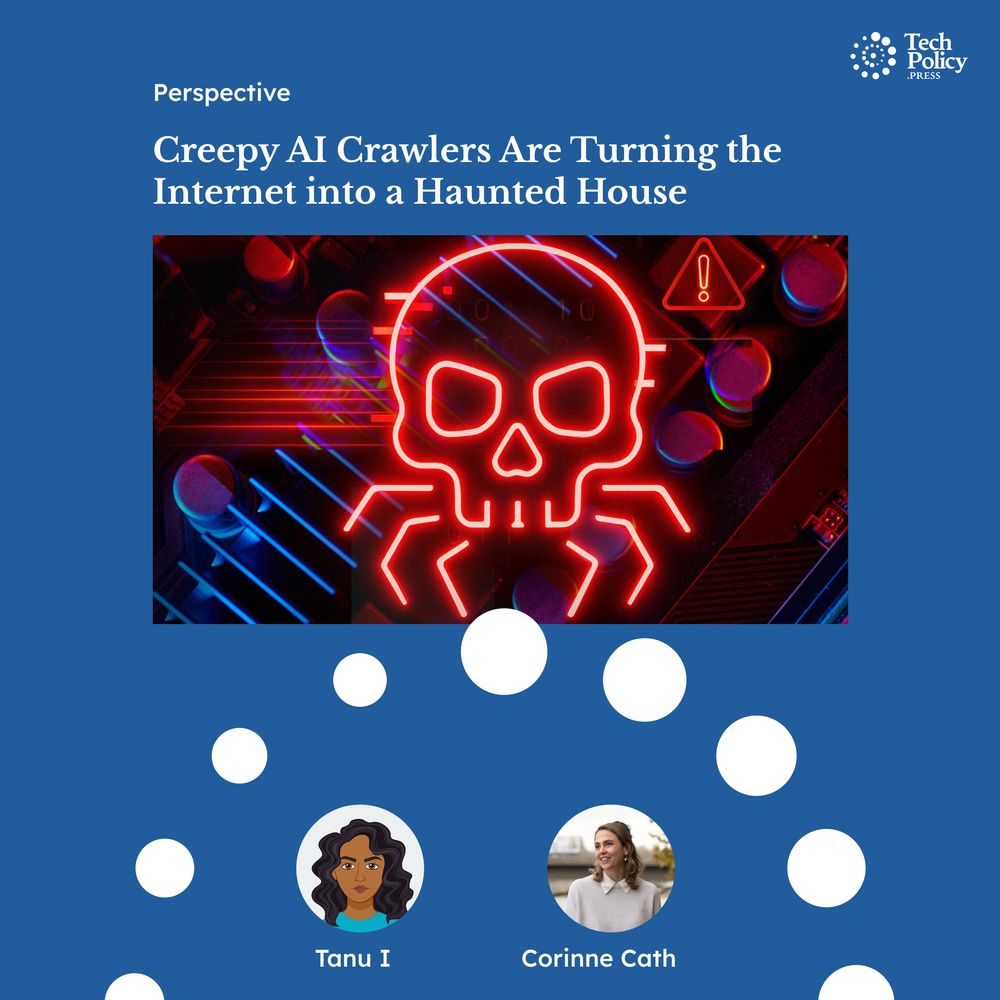
November 1, 2025 at 1:30 PM
Creepy crawlers collecting data for generative AI are making the internet work less well for everyone, write Article 19's Tanu I & Corinne Cath. AI crawlers slow sites, strain libraries, and push journalism behind paywalls, they write.
buff.ly/0pTtqiT
buff.ly/0pTtqiT
As India–US relations shift amid geopolitical tensions, calls for “digital sovereignty” are growing louder, argues Tech Policy Press Fellow Prateek Waghre.
buff.ly/fwcmmSe
buff.ly/fwcmmSe
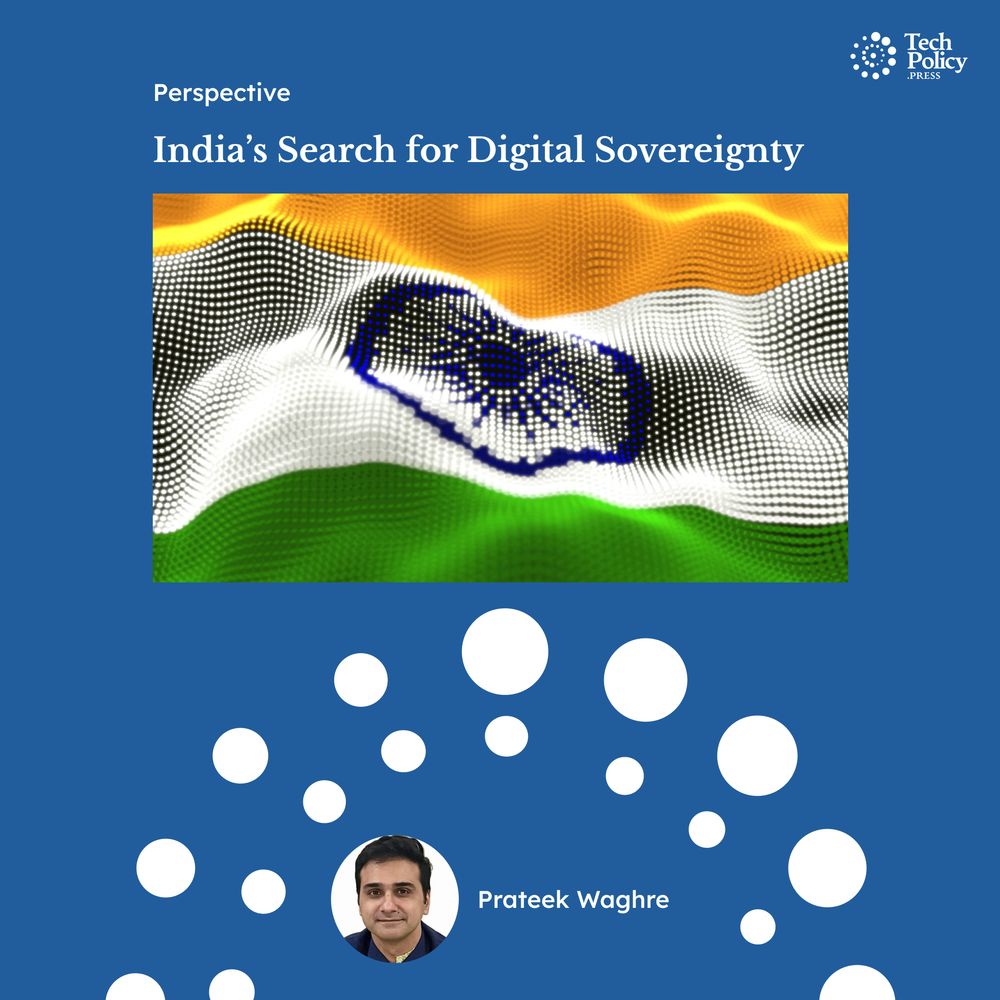
November 1, 2025 at 10:00 AM
As India–US relations shift amid geopolitical tensions, calls for “digital sovereignty” are growing louder, argues Tech Policy Press Fellow Prateek Waghre.
buff.ly/fwcmmSe
buff.ly/fwcmmSe
Platforms are accelerating the transition to AI for content moderation, laying off trust and safety workers and outsourced moderators in favor of automated systems, writes Tim Bernard.
buff.ly/EvVEFfO
buff.ly/EvVEFfO

October 31, 2025 at 1:02 PM
Platforms are accelerating the transition to AI for content moderation, laying off trust and safety workers and outsourced moderators in favor of automated systems, writes Tim Bernard.
buff.ly/EvVEFfO
buff.ly/EvVEFfO
As India–US relations shift amid geopolitical tensions, calls for “digital sovereignty” are growing louder, argues Tech Policy Press Fellow Prateek Waghre. Yet, India’s push to build homegrown platforms raises new questions about democracy in a volatile global tech order.
buff.ly/fwcmmSe
buff.ly/fwcmmSe

October 31, 2025 at 11:01 AM
As India–US relations shift amid geopolitical tensions, calls for “digital sovereignty” are growing louder, argues Tech Policy Press Fellow Prateek Waghre. Yet, India’s push to build homegrown platforms raises new questions about democracy in a volatile global tech order.
buff.ly/fwcmmSe
buff.ly/fwcmmSe
OpenAI completed a restructuring this week that will enable it to more easily raise funds, a move that raises questions about the future of its safety efforts and its commitment to developing AI that "benefits all of humanity," Cristiano Lima-Strong reports.
buff.ly/qW46FvW
buff.ly/qW46FvW
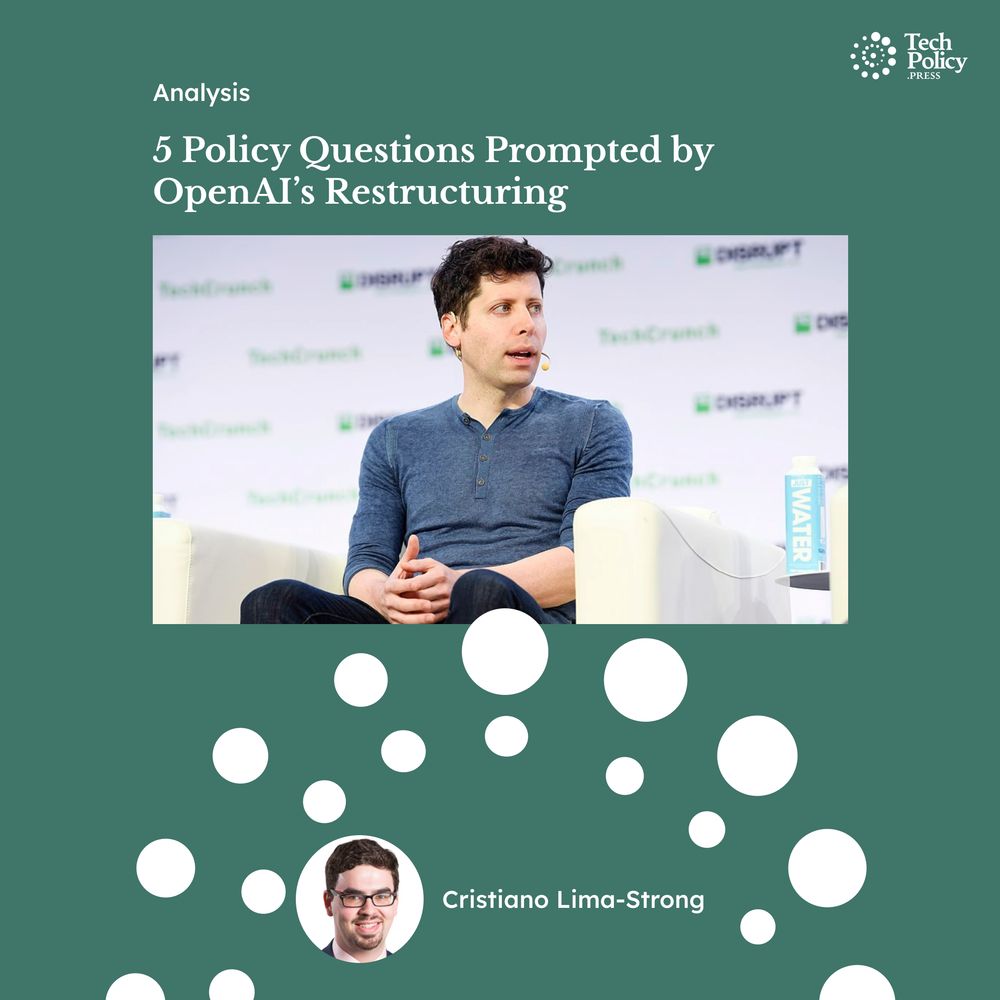
October 30, 2025 at 1:01 PM
OpenAI completed a restructuring this week that will enable it to more easily raise funds, a move that raises questions about the future of its safety efforts and its commitment to developing AI that "benefits all of humanity," Cristiano Lima-Strong reports.
buff.ly/qW46FvW
buff.ly/qW46FvW
OpenAI’s ChatGPT has crossed 120 million EU users for its search feature and may fall under the Digital Services Act. Ramsha Jahangir breaks down what this could mean for the regulation of AI chatbots in Europe.
buff.ly/JEFSCE5
buff.ly/JEFSCE5

October 30, 2025 at 12:03 PM
OpenAI’s ChatGPT has crossed 120 million EU users for its search feature and may fall under the Digital Services Act. Ramsha Jahangir breaks down what this could mean for the regulation of AI chatbots in Europe.
buff.ly/JEFSCE5
buff.ly/JEFSCE5
Building evidence and driving toward scientific consensus around AI’s impact on youth mental health is not going to be straightforward, but industry can and should engage with and support better research, says Betsy Masiello, cofounder of Proteus Strategies.
buff.ly/79VTteV
buff.ly/79VTteV

October 29, 2025 at 5:04 PM
Building evidence and driving toward scientific consensus around AI’s impact on youth mental health is not going to be straightforward, but industry can and should engage with and support better research, says Betsy Masiello, cofounder of Proteus Strategies.
buff.ly/79VTteV
buff.ly/79VTteV
📢Webinar Alert📢
Attention is the currency of the digital age—but who controls it, and to what end? Join Nathan Schneider (University of Colorado Boulder) for a discussion on how attention economics shapes the digital public sphere.
Register here: columbiauniversity.zoom.us/webinar/regi...
Attention is the currency of the digital age—but who controls it, and to what end? Join Nathan Schneider (University of Colorado Boulder) for a discussion on how attention economics shapes the digital public sphere.
Register here: columbiauniversity.zoom.us/webinar/regi...
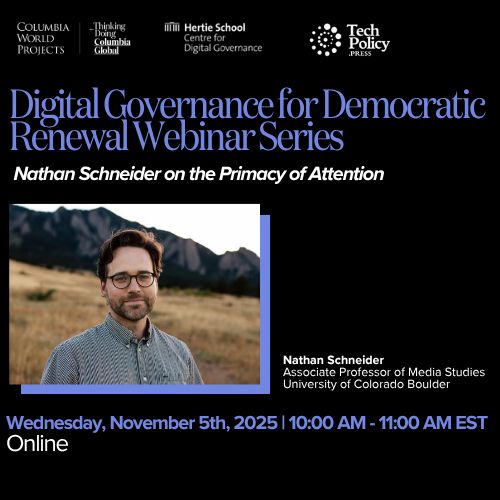
October 29, 2025 at 3:02 PM
📢Webinar Alert📢
Attention is the currency of the digital age—but who controls it, and to what end? Join Nathan Schneider (University of Colorado Boulder) for a discussion on how attention economics shapes the digital public sphere.
Register here: columbiauniversity.zoom.us/webinar/regi...
Attention is the currency of the digital age—but who controls it, and to what end? Join Nathan Schneider (University of Colorado Boulder) for a discussion on how attention economics shapes the digital public sphere.
Register here: columbiauniversity.zoom.us/webinar/regi...
The UK Ministry of Justice’s £6.75m OpenAI deal raises sovereignty concerns, writes Tech Policy Press fellow Megan Kirkwood, part of a continued trend in the UK government to outsource important public infrastructure to US Big Tech.
buff.ly/oiEaztE
buff.ly/oiEaztE

October 29, 2025 at 2:21 PM
The UK Ministry of Justice’s £6.75m OpenAI deal raises sovereignty concerns, writes Tech Policy Press fellow Megan Kirkwood, part of a continued trend in the UK government to outsource important public infrastructure to US Big Tech.
buff.ly/oiEaztE
buff.ly/oiEaztE
AI is failing the test when it comes to factual accuracy; the decline of news and journalism won't help. It serves the financial interest of AI companies—and the mission of the OpenAI nonprofit—to invest in reviving local news, says Rebuild Local News President Steven Waldman.
buff.ly/EXkbg9y
buff.ly/EXkbg9y

October 29, 2025 at 1:51 PM
AI is failing the test when it comes to factual accuracy; the decline of news and journalism won't help. It serves the financial interest of AI companies—and the mission of the OpenAI nonprofit—to invest in reviving local news, says Rebuild Local News President Steven Waldman.
buff.ly/EXkbg9y
buff.ly/EXkbg9y

